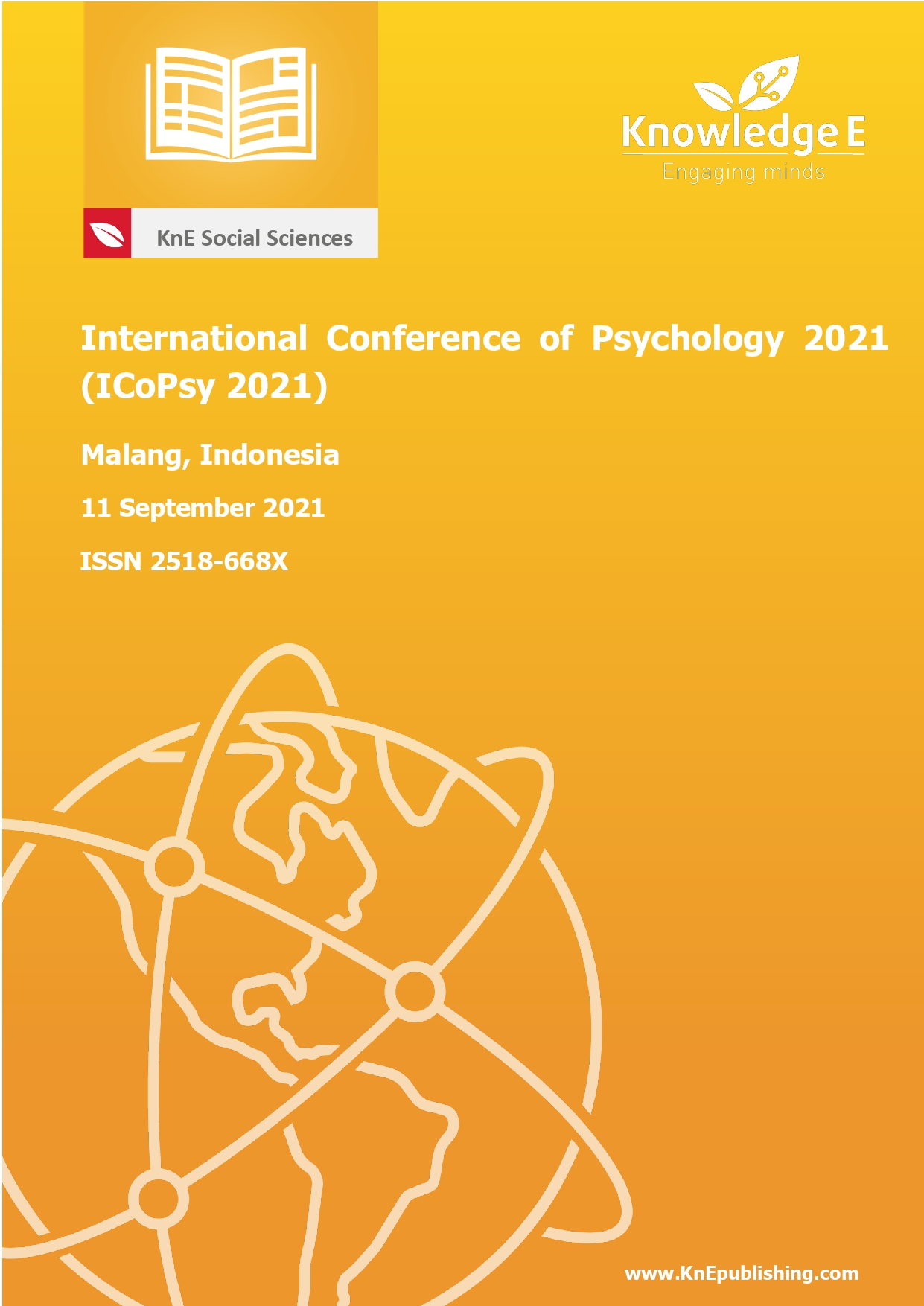The Correlation Between Husbands' Social Support and Anxiety in Mothers Who Have Experienced Mom-Shaming in Malang City
DOI:
https://doi.org/10.18502/kss.v7i1.10205Abstract
This research aimed to describe husbands’ social support and anxiety in mothers who have experienced mom-shaming in Malang city. A quantitative and descriptive correlational approach was used. The study aimed to determine whether there was a relationship between these two variables. Data were collected using The Husband’s Social Support Scale and The Mother’s Anxiety Scale. 118 women participated with the following characteristics: (a) mothers who have experienced mom-shaming; (2) mothers who have double roles such as a role as a wife and mother; and (3) residence in Malang. The research findings produced a Pearson correlation of -0.349 with a p-value < 0.05. Based on this result, it can be concluded that there is a negative correlation between husbands’ social support and mothers’ anxiety.
Keywords: husbands’ social support, anxiety, mom-shaming
References
Sutherland JA. Mothering, guilt and shame. Sociology Compass. 2010;4(5);310-321. doi : https://doi.org/10.1111/j.1751-9020.2010.00283.
Adiyanto W, Afiati AI. Mekanisme kuasa dalam fenomena mom shaming pada peran perempuan sebagai ibu. Lontar: Jurnal Ilmu Komunikasi. 2020;8(1):1–15.
C.S. Mott Children’s Hospital. Mott poll report: Mom shaming or constructive criticism? Perspectives of Mothers. 2017;29(3):1-2. Available from: https://mottpoll.org/reports-surveys/mom-shaming-or-constructive-criticismperspectives- mothers
Sopiyani L. Hubungan antara dukungan sosial (suami) dengan motivasi memberikan asi eksklusif pada ibu-ibu di kabupaten klaten. Surakarta: Muhammadiyah University of Surakarta; 2014. https://doi.org/10/10._lampiran.pdf
Sarafino EP, Smith TW. (2011). Health psychology: Biopsychosocial interactions. 7th ed. New York: John Wiley & Sons. Inc; 2011.
Silalahi UA. Hubungan antara dukungan sosial suami dengan tingkat kecemasan wanita menopause kota tasikmalaya tahun 2015. Jurnal Bidan. 2016;2(1):6.
Savira A. Praktik mom shaming oleh netizen indonesia terhadap selebritis yang melakukan sharenting di media sosial. Medkom: Jurnal Media dan Komunikasi. 2020;1(1):40–54.
Sawitri N. Perbedaan kecemasan pada ibu muda antara yang pernah dan tidak pernah mendapatkan mom shaming. Yogyakarta:Technolocy University of Yogyakarta; 2020.
Crockenberg SB. Infant irritability, mother responsiveness, and social support influences on the security of infant-mother attachment. Child Development. 1981;52(3):857–865.
Chavis L. Mothering and anxiety: Social support and competence as mitigating factors for first-time mothers. Social Work in Health Care. 2016;55(6):461–480. https://doi.org/10.1080/00981389.2016.1170749
Pierce GR, Sarason BR, Sarason IG. Handbook of social support and the family. Berlin: Springer Science & Business Media; 1996. 33333
Shumaker SA, Brownell A. Toward a theory of social support: Closing conceptual gaps. Journal of Social Issues. 1984;40(4):11–36. https://doi.org/10.1111/j.1540- 4560.1984.tb01105.
DeLongis A, Capreol M, Holtzman S, O’Brien T, Campbell J. Social support and social strain among husbands and wives: A multilevel analysis. Journal of Family Psychology. 2004;18(3):470–479. https://doi.org/10.1037/0893-3200.18.3.470
Speilberger CD. Conceptual and methodological issues in anxiety research. Academic Press. 1972;14: 481-493. https://doi.org/10.1016/B978-0-12-657402-9.50013-2
Wolman BB. Dictionary of behavioral science. 2nd ed. San Diego: Academic Press; 1989.
Ramaiah S. Kecemasan, bagaimana mengatasi penyebabnya. Jakarta: Yayasan Obor Indonesia; 2003.
Keedwell P, Snaith RP. What do anxiety scales measure? Acta Psychiatrica Scandinavica. 1996;93(3):177–180. https://doi.org/10.1111/j.1600-0447.1996.tb10627.
Warren PL. First-time mothers: Social support and confidence in infant care. Journal of Advanced Nursing. 2005;50(5):479–488. https://doi.org/10.1111/j.1365- 2648.2005.03425.
Hays S. The cultural contradictions of motherhood. CT: Yale University Press; 1996.
Liss M, Schiffrin HH, Rizzo KM. Maternal guilt and shame: The role of self-discrepancy and fear of negative evaluation. Journal of Child and Family Studies. 2013;22(8):1112– 1119. https://doi.org/10.1007/s10826-012-9673-2
Braithwaite J, Braithwaite PF. Crime, shame and reintegration. Cambridge: Cambridge University Press; 1989.
Medical Xpress. How to deal with online mom-shaming. 2018;1–2. Available from: https://medicalxpress.com/news/2018-07-online-mom-shaming.html
Sugiyono. Statistika untuk penelitian. Bandung: Alfabeta; 2016.
Azwar S. Reliabilitas dan validitas. Yogyakarta: Pustaka Pelajar; 2001.
Myers DG. Psychology. 9th ed. New York: Worth Publishers; 2010.
Dehle C, Larsen D, Landers JE. Social support in marriage. The American Journal of Family Therapy. 2001;29(4):307–324. https://doi.org/10.1080/01926180126500
Johnson DW, Johnson FP. Joining together: Group theory and group skills. 4th ed. New Jersey: Prentice-Hall, Inc; 1991.
Dunkel-Schetter C, Folkman S, Lazarus RS. Correlates of social support receipt. Journal of Personality and Social Psychology. 1987;53(1):71–80.
Goldstein LH, Diener ML, Mangelsdorf SC. Maternal characteristics and social support across the transition to motherhood: Associations with maternal behavior. Journal of Family Psychology. 1996;10(1):60–71. https://doi.org/10.1037/0893- 3200.10.1.60
Liss M, Schriffin HH, Rizzo K. Maternal guilt and shame: the role of self-discrepancy and fear of negative evaluation. Journal of Child and Family Studies. 2013 Nov;22(8):1112-1119. doi : http://dx.doi.org/10.1007/s10826-012-9673-2
Dunford E, Granger C. Maternal guilt and shame: Relationship to postnatal depression and attitudes towards help-seeking. Journal of Child and Family Studies. 2017;26(6):1692–1701. https://doi.org/10.1007/s10826-017-0690-z
Stuart GW. Buku saku: Keperawatan jiwa. Jakarta: EGC; 2006.
Julianty E, Prasetya BEA. Hubungan antara dukungan sosial suami dengan konflik peran ganda pada guru wanita di kabupaten halmahera barat. Jurnal Psikologi Perseptual. 2016;1(1):27–39. https://doi.org/10.24176/perseptual.v1i1.1077
Ghufron MN, Risnawita R. Teori-teori psikologi. Yogyakarta: Ar-Ruzz Media; 2012.
Baron RA, Branscombe NR. Social psychology. 13th ed. Harlow, Essex: Pearson; 2014.
Nursalam. Metodologi penelitian ilmu keperawatan: Pendekatan praktis. Jakarta: Salemba Medika; 2014.
Gjesfjeld CD, Greeno CG, Kim KH, Anderson CM. Economic stress, social support, and maternal depression: Is social support deterioration occurring? Social Work Research. 2010;34(3):135–143. https://doi.org/10.1093/swr/34.3.135
Putri F, Asih SW, Hidayat D. (2017). Hubungan dukungan suami dengan tingkat kecemasan wanita pramonepause di desa bangalsari kecamatan bangalsari jember. 2017;13(2):126–138.
Masrurah N. Hubungan persepsi terhadap dukungan sosial suami dengan kecemasan istri dalam menghadapi persalinan. Malang: Universitas Muhammadiyah Malang. Insight Jurnal Pemikiran dan Penelitan Psikologi ; 2017;3(2):126-138.
Andayani SRD, Hargono R. Husband involvement to accompanying his wife in cesarean section delivery in reducing anxiety for successful implementation early

